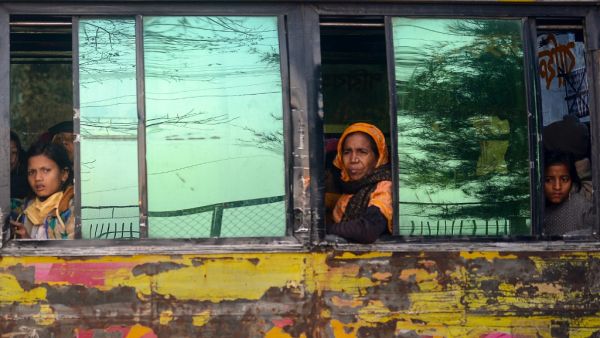The once tension-ridden face of Ansar Hossain, a Rohingya refugee living on a remote Bangladeshi island, now exudes tranquility and peace.
Hossain is one of the 1,804 Rohingya refugees who were relocated to Bhasan Char, a Bengali language term synonymous with 'floating island,' from Cox's Bazar refugee camp in Bangladesh on Dec. 29 last year.
Leaving the world's largest refugee camp and constant supervision of dozens of international aid agencies and NGOs, he migrated to the island with the dream of leading a better life than that in the packed camps.
Turkish charity dispatches aid to Rohingya refugees https://t.co/rzRl1H0dpJ pic.twitter.com/sfPLTu6fIc
— ANADOLU AGENCY (ENG) (@anadoluagency) January 30, 2021
During the departure of thousands of his fellow Rohingya in the landlock camps, home to more than 1.1 million stateless Rohingya, Hossain relied on the commitment of Bangladeshi authorities that they would lead a better and more secure life with livelihood opportunities on the island.
However, tensions were mounting up in him along with all others at the island due to the restrictions.
In two phases Bangladesh government has relocated more than 3,400 Rohingya to the island as part of its plan to relocate 100,000 members of the persecuted people to the island, 50 kilometers (31 miles) off Bangladesh southeastern coast and nearly 193 km (120 miles) south of capital Dhaka.
Bangladesh began the relocation process amid huge concerns and opposition from the international communities on grounds of safety at the island, reportedly prone to natural disasters and lack of habitability.
But Hossain is now a bit satisfied along with thousands of others as the Bangladesh government has visibly started livelihood programs for them.
Launching mega training
With the presence of around 400 Rohingya, the Bangladeshi authority on Wednesday launched a mega training and awareness building project on the island.
Under the project, Rohingya refugees on a 25-years old island in the Bay of Bengal will be given training on cultivation, poultry and cow farming, fisheries, sewing and other home-based small and medium livelihoods.
"Bangladeshi authorities even assured us of serving seeds for cultivation at lands near our concrete houses," Hossain told Anadolu Agency.
"The government-run Bangladesh Rural Development Board (BRDB) has begun the project as part of our government's commitment to creating livelihood opportunities on the remote island," director of the island-based Rohingya resettlement project, Commodore Abdullah Al Mamun Chowdhury, told Anadolu Agency.
Spending over $350 million from its internal resources, Bangladesh has developed the resettlement project on 13,000 acres of land with 120 multistoried cyclone shelters and 1,400 big cluster houses 4 feet above the ground with concrete blocks on the island for Rohingya refugees.
Addressing the training program, as a great opportunity to keep Rohingya hope alive at the island settlements, BRDB director-general, Supriya Kumar Kundu, said that like other parts of the country, the government has ordered us to work for the development of life and livelihood of the stateless Rohingya on the island.
"We have developed a training module for you and as part of the mega training we have arranged now a five-day training and orientation," Kundu said while addressing the gathering on the island in winter noon.
He added: "Five sources of livelihood including cultivation, poultry farm, cattle farm, fisheries and cottage industry are the priority of training."
He also informed that this preliminary training will be given to every "capable male and female" of all Rohingya families on the island.
Later, skills-based in-depth training will be arranged, he added.
Dreams mounting for an honorable life
Another Rohingya on the island Mohammad Faruk told Anadolu Agency that after Wednesday's declaration, they are now dreaming of an honorable life in the distant sea.
"Until our peaceful repatriation to our home country Myanmar we want to work and earn by our own hands to feed for families," he added.
An estimated 860,000 Rohingya Muslims who fled a brutal military crackdown in Myanmar's Rakhine State almost three and half years ago joined the already persecuted Rohingya in Bangladesh, making the settlements in Cox's Bazar as world's largest refugee gathering.
Intending to ease the unhygienic and packed camps, Bangladeshi authorities decided to shift 100,000 Rohingya to the remote island.
Bangladesh’s government has sent a fourth group of Rohingya Muslim refugees to an island in the Bay of Bengal, ignoring calls from human rights groups for a halt to the move. https://t.co/zvUzrY4bOV
— ABC News (@ABC) January 30, 2021
Repatriation, the main concern
Meanwhile, speaking to Anadolu Agency a young Rohingya leader applauded the initiative to make the refugees on the island self-employed but also expressed concerns about whether such a move contributes to delay the repatriation of Rohingya to the home country.
"Myanmar is not showing any positive sign till the date that it is really eager to take back its citizens and in the meantime, more than 50,000 newborn babies have been added with us," KHIN Maung, Executive Director of Bangladesh-based Rohingya Youth Association (RYA), told Anadolu Agency.
He added: "I appreciate the Bangladesh government for what they are doing for our people on the island, but my concern is that whether we can return to our original hometown, Arakan (Rakhine) state."
Underlining the position of the international communities, he added: "If the international communities do not corporate with Bangladesh government to help the people on the Island, what will be the ultimate consequence of us?"
This article has been adapted from its original source.








